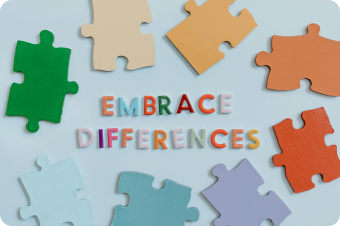In a world where diversity is increasingly celebrated, neurodiverse communities often face unique challenges that limit their opportunities to thrive. Inclusion is not just a moral imperative—it’s a crucial step toward building equitable societies that harness the potential of every individual.
What Is Neurodiversity?
Neurodiversity refers to the natural variation in human brain function and behavior, encompassing conditions such as autism, ADHD, dyslexia, and others. It challenges the idea of “normal” brain function, emphasizing that different neurological conditions are not deficits but rather part of the diverse human experience.
Why Inclusion Matters
- Fostering Equity and Belonging
Inclusion ensures that neurodiverse individuals are not marginalized or excluded from opportunities due to their differences. By creating environments where everyone feels valued and supported, we promote a sense of belonging that is critical for mental health and personal growth.
For example, inclusive classrooms that embrace diverse learning styles help neurodiverse students excel academically and socially, fostering lifelong confidence and skills. - Unlocking Potential
Many neurodiverse individuals possess exceptional talents and perspectives that can drive innovation and creativity. By including them in workplaces, schools, and communities, society benefits from unique contributions that might otherwise go unnoticed.
Companies like Microsoft and SAP have embraced neurodiverse hiring programs, recognizing the strengths these individuals bring to problem-solving, attention to detail, and creativity. - Breaking Down Stigma
Inclusion helps dismantle stereotypes and misconceptions about neurodiverse individuals. Awareness campaigns, representation in media, and open conversations encourage acceptance and empathy, replacing fear or misunderstanding with respect and compassion.
How to Foster Inclusion for Neurodiverse Communities
- Accessible Education and Training
Inclusive education ensures that neurodiverse students receive the support they need, such as individualized learning plans, sensory-friendly classrooms, and trained educators. Beyond schools, life skills training and community programs equip neurodiverse individuals with tools for independence and success. - Workplace Accommodation
Workplaces play a significant role in fostering inclusion. Simple accommodations like flexible work environments, clear communication practices, and mentorship programs can enable neurodiverse employees to thrive. - Advocacy and Awareness
Organizations and individuals must advocate for policies that support neurodiverse communities. Public awareness campaigns and community events help highlight the value of neurodiversity and promote inclusive practices.
The Role of Community
Communities are the backbone of inclusion. By creating safe spaces, offering resources, and building support networks, communities empower neurodiverse individuals and their families. Whether through support groups, inclusive events, or therapy programs, the collective effort creates lasting impact.
A Call to Action
Inclusion for neurodiverse communities is not just about acceptance—it’s about celebration. By embracing neurodiversity, we enrich our societies with fresh perspectives, creativity, and compassion. Let’s work together to create a world where everyone, regardless of neurological differences, has the opportunity to thrive.
Whether you’re an educator, employer, or community member, your actions matter. Let’s start building a more inclusive future today.
